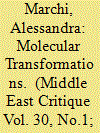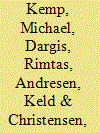|
|
|
Sort Order |
|
|
|
Items / Page
|
|
|
|
|
|
|
| Srl | Item |
| 1 |
ID:
178142


|
|
|
|
|
| Summary/Abstract |
The increasing interest in Antonio Gramsci’s thought constitutes an important source of inspiration in the study of the Middle East and North Africa, particularly in the post-2011 Arab uprisings period. The popularity of the Italian Marxist thinker is to be found in the original applications and uses of Gramscian categories, which have given rise to a growing secondary literature, especially outside Italy and Europe, beyond Gramsci’s immediate background and beyond the context of his own historical and political analysis. The revolutionary moment of 2011, the crisis of hegemony, and thus the crisis of ‘the State as a whole’ (stato integrale), is present in different ways in Arab countries, where many groups within civil society live, work, compete and protest tirelessly. This article draws attention to the less explored Gramscian concept of the “molecular” and argues for the importance of reading molecular, even fragmented, ways to resist the manufacturing of consent and the dominant hegemony during revolutionary moments, such as the pre- and post-2011 periods. The concept of the ‘molecular’ (molecolare) is fundamental to shedding light on the potentially transformative implications of everyday contentious actions and helps us to scrutinise what kind of hegemony is possible in Arab-Mediterranean countries today. Furthermore, Gramsci enables us to confront multiple, singular experiences of ‘others’ – which already are shaping contemporary history in different world regions while being intertwined with global history. This article shows how the theoretical, methodological and political potential of Gramscian interpretations is vital to – and can be enriched and renewed by – a promising, ongoing interdisciplinary dialogue.
|
|
|
|
|
|
|
|
|
|
|
|
|
|
|
|
| 2 |
ID:
126248


|
|
|
|
|
| Publication |
2012.
|
| Summary/Abstract |
In 2002 it was decided to establish laboratory facilities in Denmark for diagnosing agents associated with bioterrorism in order to make an immediate appropriate response to the release of such agents possible. Molecular assays for detection of specific agents and molecular and proteomic techniques for identification of bacteria were introduced as part of the program. All assays and techniques were made accessible for use in diagnosing patients, even when an intentional release was not suspected. Medical expertise on different diseases was established at the department as an integrated part of the program. The analyses included PCR assays for specific bacteria, identification of isolated bacteria by DNA sequencing, detection and identification of bacteria in clinical sample material by universal bacterial PCR and DNA sequencing, and identification of bacteria by mass spectrometry. The established analyses formed a basis on which a series of further developments was built. In addition to reducing the time for obtaining diagnoses and improving the accuracy of diagnosis of individual infected patients, the analyses provided new knowledge on the frequency and distribution of some bacterial infections, including Q fever, tularemia, trench fever, brucellosis, and melioidosis. The implementation of an antibioterrorism program in a clinical diagnostic setting improved the diagnostic possibilities for patients in Denmark and provided new epidemiologic information. It also introduced a number of diagnostic assays for bacterial infections not associated with bioterrorism that are difficult to culture or identify.
|
|
|
|
|
|
|
|
|
|
|
|
|
|
|
|
|
|
|
|
|